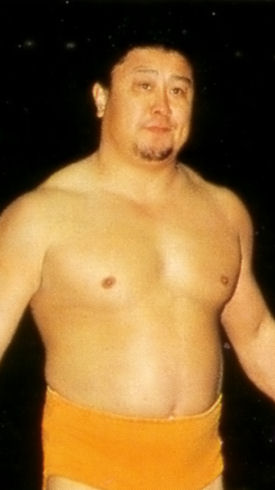Takasugi: Difference between revisions
No edit summary |
|||
| Line 18: | Line 18: | ||
== Biography == | == Biography == | ||
<font face="Verdana"> | <font face="Verdana"> | ||
Masahiko Takasugi (????, June 17, 1955 - ) made his pro debut on September 4, 1977 in Tokyo's Korakuen Hall against Snake Imami, for the IWE (International Wrestling Enterprise) promotion. When the promotion collapsed in 1981, perhaps influenced by | Masahiko Takasugi (????, June 17, 1955 - ) made his pro debut on September 4, 1977 in Tokyo's Korakuen Hall against Snake Imami, for the IWE (International Wrestling Enterprise) promotion. When the promotion collapsed in 1981, perhaps influenced by the lucha wrestlers that worked for IWE like [[Herodes]] or [[Carlos Plata]], he went to a "Mexico expedition" on his own to learn the style. | ||
[[Image:ultraseven.jpg|150px|thumb|right|Ultraseven, circa 2002]]As usual with Japanese wrestlers, his ringname got shortened to only his last name (Takasugi). He worked for EMLL and didn't make an impact, but got a "Lucha Libre" magazine cover posing with [[Rayo de Jalisco Jr.]] and [[Ringo Mendoza]]. | [[Image:ultraseven.jpg|150px|thumb|right|Ultraseven, circa 2002]]As usual with Japanese wrestlers, his ringname got shortened to only his last name (Takasugi). He worked for EMLL and didn't make an impact, but got a "Lucha Libre" magazine cover posing with [[Rayo de Jalisco Jr.]] and [[Ringo Mendoza]]. | ||
He made his return to Japan on June of 1982, and his style renewal got him to sign with [[All Japan Pro Wrestling]] to become the marked Ultraseven (???????), a character based on a spin-off the original Ultraman series in Japan. Timing was right, as AJPW made a half-hearted attempt to launch a based division, so he got to work good matches with the likes of [[Chavo Guerrero]], [[Mach Hayato]] and [[Lizmark]], as well as teaming on a few occassions with [[Mil Mascaras]] when it was uncommon to see a Japanese (other than Jumbo Tsuruta) teaming with him. As Ultraseven he was a good worker, but perhaps a tad too heavy for the style he was working. Still, he was part of fun matches with the names mentioned above, and for a short time, formed a "Japanese maskman" team with Magic Dragon. | |||
He was let go as part of a 1986 roster clean-up, and | He was let go as part of a 1986 roster clean-up, and wandered around the then barely unexistent indy scene until forming in the late 80s the Pioneer promotion with Ryuma Go and Apollo Sugawara. After that closed, he worked under his real name at many promotions like Goro Tsurumi's International Pro, Oriental Pro or IWA Japan, where he finally settled. He eventually re-unmasked under his old moniker, and even though he's now slowed down, his style still shows flashes of lucha libre and he still is a good character in the wacky world of Japanese independent wrestling. | ||
</font> | </font> | ||
[[Category:Foreign wrestlers]] | [[Category:Foreign wrestlers]] | ||
[[Category:Japanese wrestlers]] | [[Category:Japanese wrestlers]] | ||
Revision as of 08:07, 18 September 2005
Profile
| Takasugi (????) | |||||||||||||||||||||||||||||
 |
|
||||||||||||||||||||||||||||
Biography
Masahiko Takasugi (????, June 17, 1955 - ) made his pro debut on September 4, 1977 in Tokyo's Korakuen Hall against Snake Imami, for the IWE (International Wrestling Enterprise) promotion. When the promotion collapsed in 1981, perhaps influenced by the lucha wrestlers that worked for IWE like Herodes or Carlos Plata, he went to a "Mexico expedition" on his own to learn the style.
As usual with Japanese wrestlers, his ringname got shortened to only his last name (Takasugi). He worked for EMLL and didn't make an impact, but got a "Lucha Libre" magazine cover posing with Rayo de Jalisco Jr. and Ringo Mendoza.
He made his return to Japan on June of 1982, and his style renewal got him to sign with All Japan Pro Wrestling to become the marked Ultraseven (???????), a character based on a spin-off the original Ultraman series in Japan. Timing was right, as AJPW made a half-hearted attempt to launch a based division, so he got to work good matches with the likes of Chavo Guerrero, Mach Hayato and Lizmark, as well as teaming on a few occassions with Mil Mascaras when it was uncommon to see a Japanese (other than Jumbo Tsuruta) teaming with him. As Ultraseven he was a good worker, but perhaps a tad too heavy for the style he was working. Still, he was part of fun matches with the names mentioned above, and for a short time, formed a "Japanese maskman" team with Magic Dragon.
He was let go as part of a 1986 roster clean-up, and wandered around the then barely unexistent indy scene until forming in the late 80s the Pioneer promotion with Ryuma Go and Apollo Sugawara. After that closed, he worked under his real name at many promotions like Goro Tsurumi's International Pro, Oriental Pro or IWA Japan, where he finally settled. He eventually re-unmasked under his old moniker, and even though he's now slowed down, his style still shows flashes of lucha libre and he still is a good character in the wacky world of Japanese independent wrestling.
